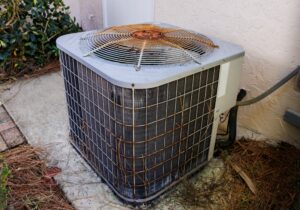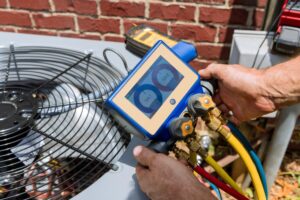Winters in Wisconsin can be a magical time. Snow clings to the trees and creates glittering landscapes. The cold breeze seems to reinvigorate the soul and makes us appreciate warmer months to come. Even though all of this seems delightful, winter comes with a number of issues when it comes to comfort in your home. Once Old Man Winter blows into town, do you experience any of these:
- Touch a door knob and… ZAP! Static electricity strikes again?
- Nose bleeds that seem to appear from nowhere, leaving you reaching for a tissue?
- Dry and cracked skin that has no sign of relief, leaving you and your family itching for summer?
- Your wood floors and furniture look like they are pleading for help and sometimes even cracking or separating?
Did you know that you don’t have to put up with these things any longer? Low humidity could be the major cause of those pesky winter occurrences. Let’s take a more in-depth look at the top signs you need a humidifier and why low humidity is so common during the winter.
How to Know if You Need a Humidifier
To maintain a healthy and comfortable living environment, it is important to ensure that the humidity level in your home is balanced. Here are the most common signs you need a humidifier in your house:
Dry Skin, Throat, & Nose
If you frequently experience dry air indoors, it may be a sign that you need a humidifier. Dry air can cause issues such as dry skin, a dry throat, and even irritated nasal passages. By introducing moisture to the air, a humidifier can alleviate these discomforts and improve overall indoor air quality.
Respiratory Discomfort
Dry air can contribute to respiratory issues such as sore throat, dry throat, and congestion. If you or your family members frequently experience these symptoms during the winter months, a humidifier can provide relief. Adding moisture to the air helps soothe the respiratory system and reduces the likelihood of these discomforts.
Check the Humidity Level
One of the simplest ways to determine if you need a humidifier is to check the level of humidity in your home. Ideally, the humidity level should be between 40% and 60%. You can use a hygrometer to measure the humidity level accurately. If it falls below this range, a humidifier can help restore a healthy moisture balance.
Damage to Wood and Furniture
Dry air can be particularly harmful to wooden furniture and flooring. If you notice cracks in your wood floors or furniture, it could be a sign that the air is too dry. A humidifier can prevent further damage by adding moisture to the air, which helps maintain the integrity of your wooden surfaces.
Static Electricity
Have you noticed an increase in static electricity shocks when walking around your home? Static is one of the biggest signs you need a humidifier. By increasing the humidity level, a humidifier can reduce static, making your home more comfortable and safe.
What Causes Low Humidity?
Humidity is water vapor that is suspended in the air. During the warmer months, the air holds onto more moisture than the air in cooler months. Once the temperatures start dropping, the cold air that enters your home from outside carries little moisture. While we run our furnaces in the winter to keep temperatures warm, it does not increase the amount of moisture in the air. The little moisture that does exist in your home gets sucked up quickly into the air, leaving your skin, nose, and even porous objects like wood furniture dry.
The Solution to Low Humidity — A Humidifier!
The best solution to low humidity is installing a whole-house humidifier. These mount right to your furnace and require very little maintenance. You can set the humidity level, and it will automatically adjust to deliver the amount you need. We recommend that most homes should be at 40-60% humidity in order to be most comfortable.
Trust Our Residential IAQ Services to Keep Your Home Comfortable
If you recognize any of these signs that you need a humidifier, call H.J. Faust, Inc. today to schedule an appointment. With our Lake Geneva HVAC services and solutions for the surrounding areas, we can help you figure out the best way to get in control of your comfort, whether that includes installing a humidifier or tuning up your HVAC system.



